Events
In this section, you can find more information about conferences, meetings, and other events where our group members present their research.
2025
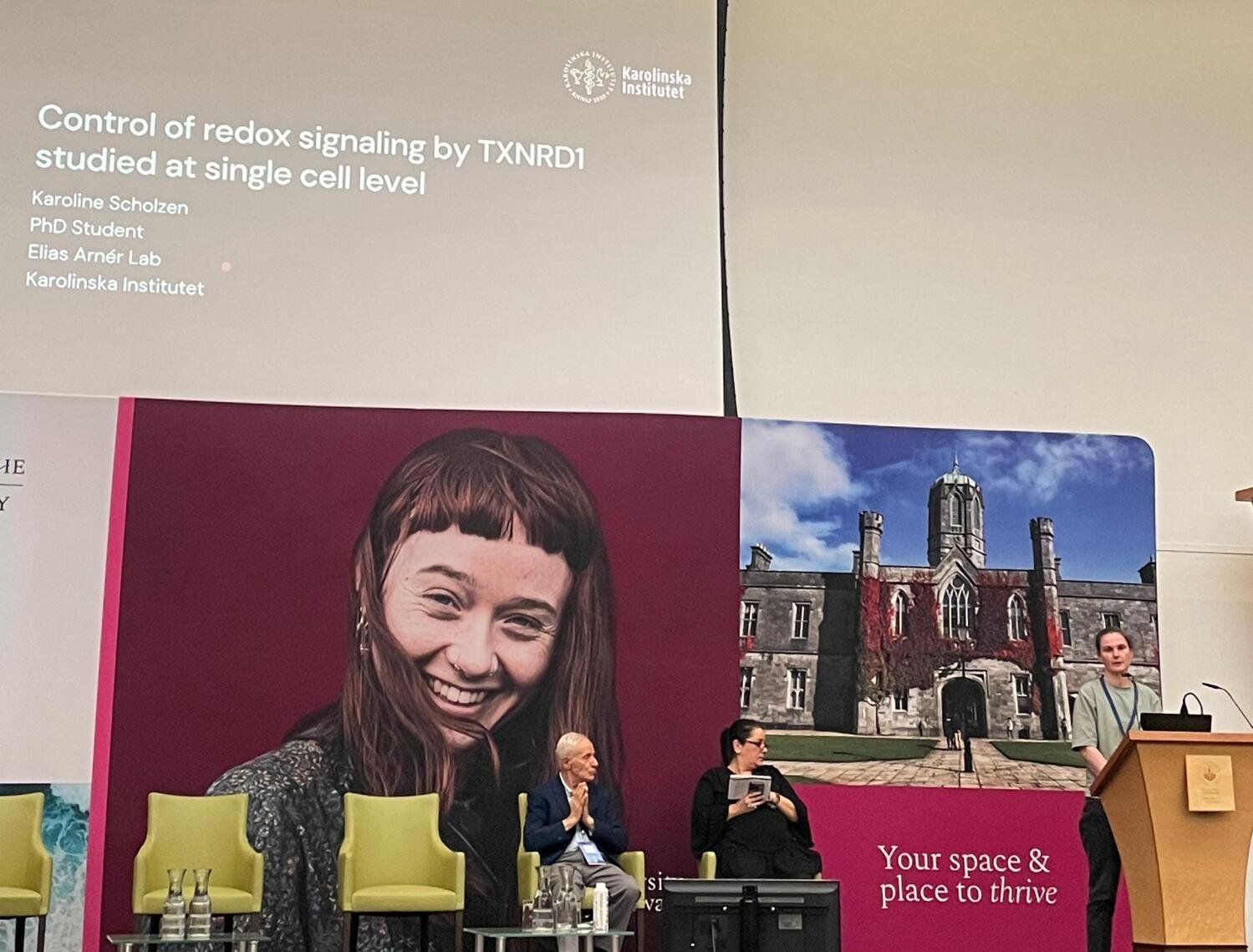
SFRRI 2025 Biennial Meeting
Last June, Karoline Scholzen , Radosveta Gencheva, and Madeleine Barrett attended the 2025 SFRRI Meeting in Galway, Ireland, where they had the opportunity to share their latest findings and connect with the international redox research community.
During the Young Investigator Award session, Karo presented a talk titled “Control of redox signaling by TXNRD1 studied at single cell level,” showcasing our ongoing efforts to understand redox dynamics at high resolution.
Radosveta delivered a flash talk on “Cell cycle arrest by short exposure to the thioredoxin reductase inhibitor TRi-1,” which was also recognized with the Young Investigator Award.
For more information about the meeting, visit SFRRI's website.
2024
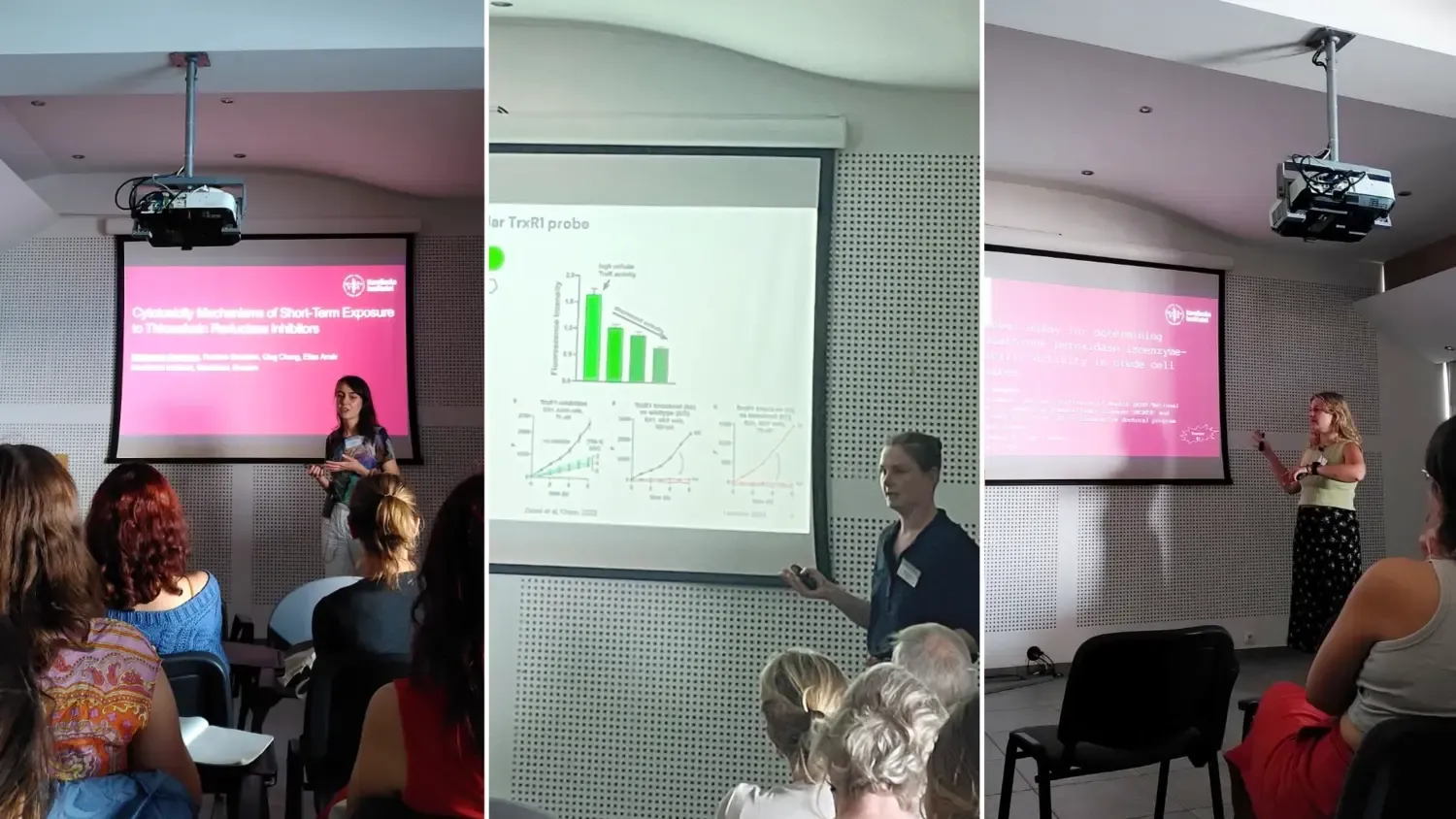
FEBS Advanced Course on Redox Biochemistry
From September 30 to October 6, 2024, three of our Ph.D. students —Radosveta Gencheva, Karoline Scholzen, and Madeleine Barrett— attended the prestigious FEBS Advanced Course titled "Redox Biochemistry: Cellular Responses and Disease Relevance". This course, organized in partnership with SFRR-Europe and IUBMB, took place in the beautiful setting of Spetses, Greece.
The course focused on the latest developments in redox biology, covering key topics such as redox control, signaling, cellular adaptations, and the role of redox-related processes in disease. Participants had the unique opportunity to interact with leading scientists from Europe and the Americas, presenting and discussing their research in both poster sessions and oral presentations.
Our students made significant contributions to the course:
- Radosveta presented her work on "Cytotoxicity Mechanisms of Short-Term Exposure to Thioredoxin Reductase Inhibitors."
- Karo shared her research on "Understanding Single Cell Redox Signaling to Decipher Heterogeneous Cellular Responses," which earned her the Young Investigator Award from SFRR-Europe.
- Maddy introduced a novel assay for determining glutathione peroxidase isoenzyme-specific activity in crude cell lysates.
The course was not only an excellent learning experience but also a wonderful opportunity to reconnect with old friends and collaborators. It was particularly exciting to share our current work with many young researchers in the field, as the event was primarily attended by Ph.D. students.
We are proud of our students' achievements and look forward to seeing how this experience will enhance their research and professional development.
For more information about the course, visit the FEBS website.
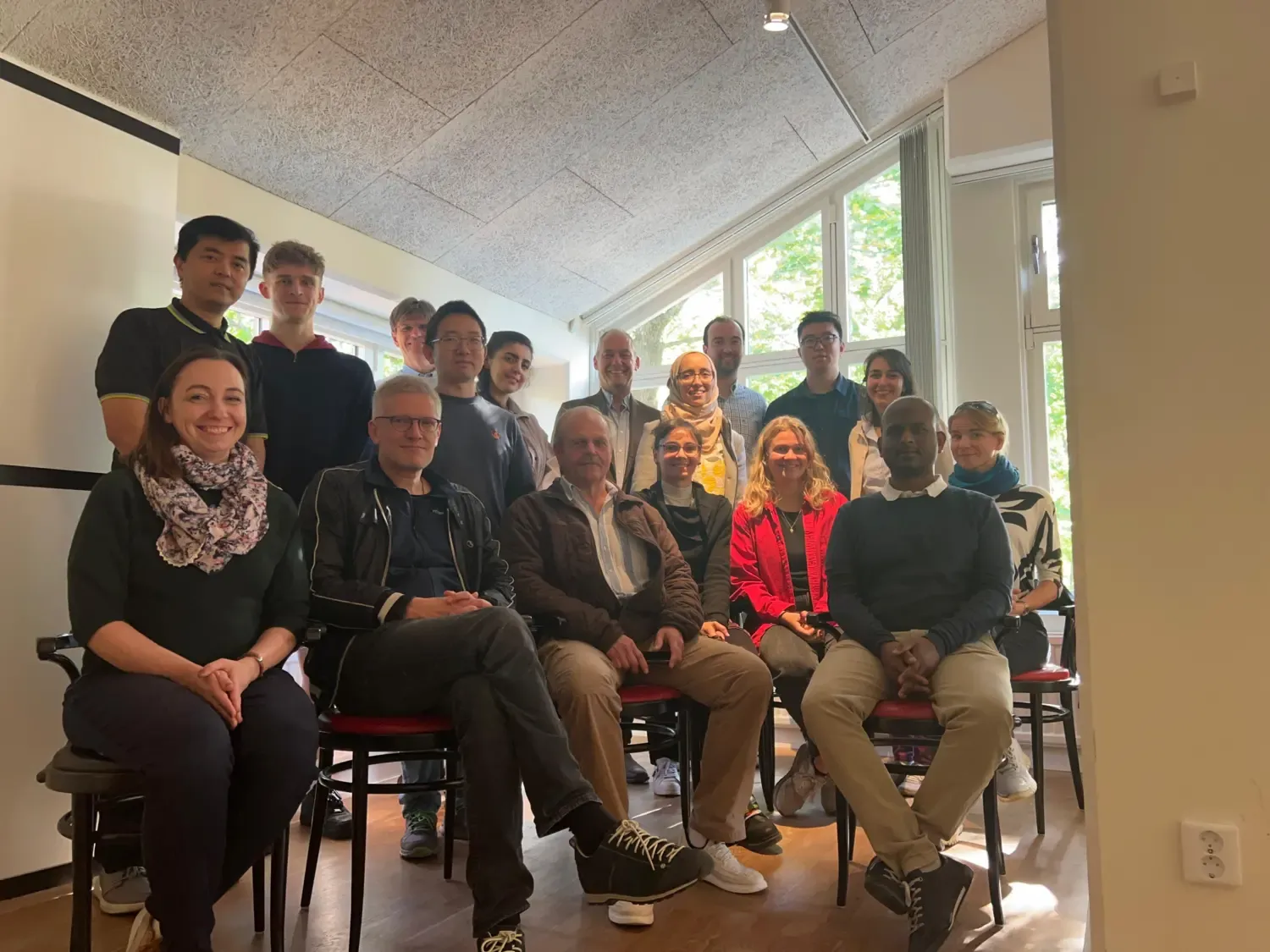
EA Group Retreat 2024
This past September, our research group gathered in Stockholm for an enriching and collaborative retreat. Held during the last week of the month, the retreat brought together all team members from both our Stockholm and Budapest labs.
The retreat featured a series of scientific presentations where each participant shared their personal research projects, highlighting significant achievements and future plans. These sessions provided a valuable platform for feedback and idea exchange, promoting new collaborations and innovative approaches between both labs.
In addition to the scientific discussions, the group enjoyed guided visits to the Tekniska museet and Etnografiska museet. These tours provided valuable perspectives on the historical and cultural contexts of technological advancements and human diversity. The Budapest team also toured the Biomedicum facilities, gaining first-hand knowledge of our shared resources and capabilities.
A welcome dinner at Elias’ house and a scenic boat trip among the islands that make up central Stockholm further strengthened the bonds within our team. The physical interaction was a refreshing change from our regular Zoom meetings, emphasizing the importance of in-person connections for effective collaboration and team spirit.
The retreat’s primary goal was to enhance our collaborative efforts, share personal projects, and develop new ideas. By meeting in person, we aimed to increase the frequency of visits between our Stockholm and Budapest labs, ensuring a more integrated and dynamic research environment.
We left the retreat feeling inspired and more connected, ready to embark on our upcoming projects with renewed energy and enthusiasm. We look forward to the next opportunity to meet.
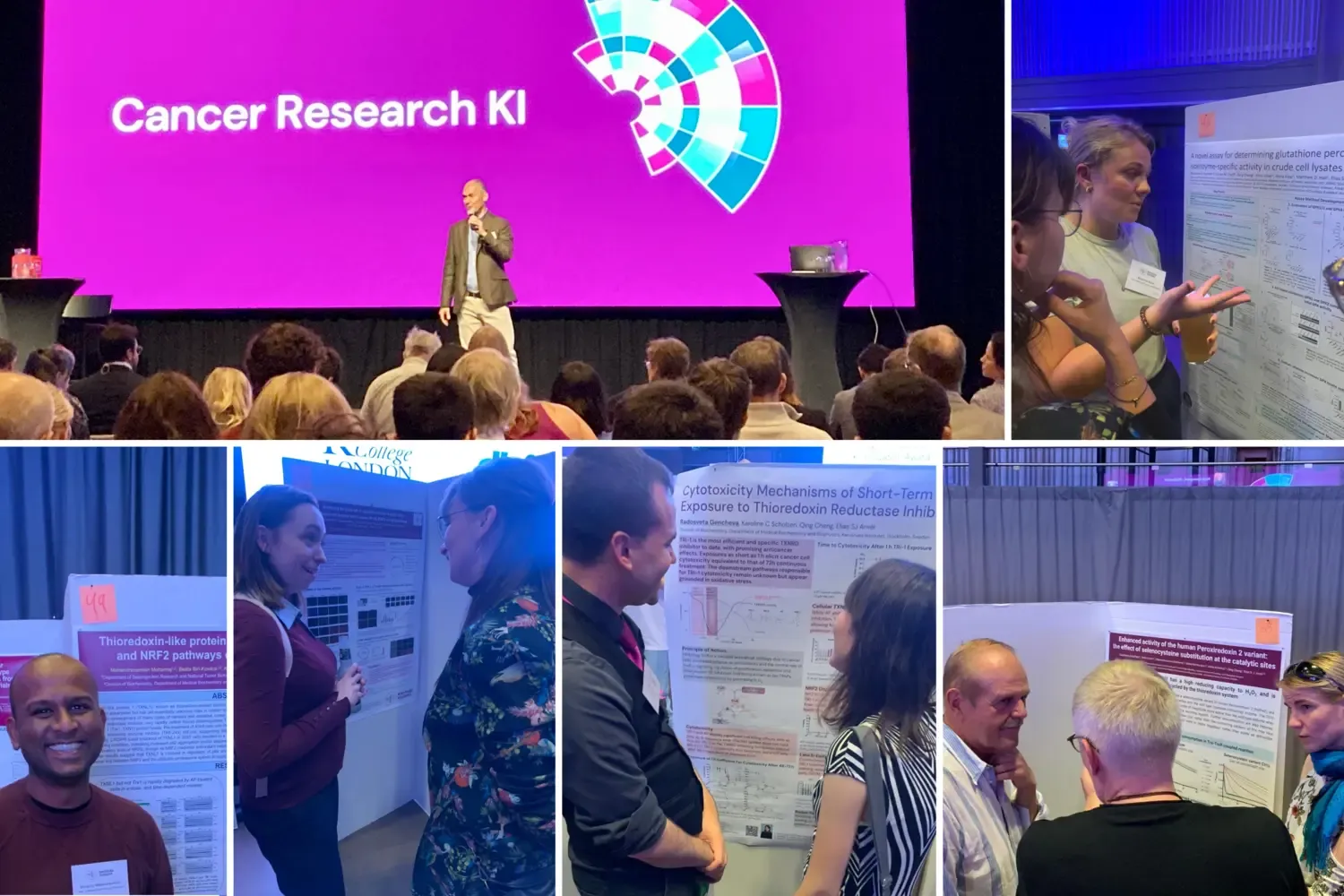
XXI Cancer Research KI Retreat
On September 23-24, 2024, our lab members from both Stockholm and Budapest actively participated in the XXIst Cancer Research KI Retreat, held at Djurönäset in the charming Stockholm archipelago. This annual event brought together leading cancer researchers from Karolinska Institutet and Karolinska University Hospital for a collaborative scientific meeting.
Our team contributed significantly to the retreat’s vibrant program, which featured international keynote lectures and presentations on groundbreaking research in cancer biology, clinical cancer research, cancer care research, and cancer epidemiology.
Our researchers presented their work during the lively poster session, engaging with peers, discussing their findings, and exploring new collaborations. This event was an excellent opportunity for our lab to highlight our ongoing work and connect with the broader cancer research community.
We look forward to continuing our advancements in cancer research and presenting our new findings next year!
For more information, visit Cancer Research KI website.
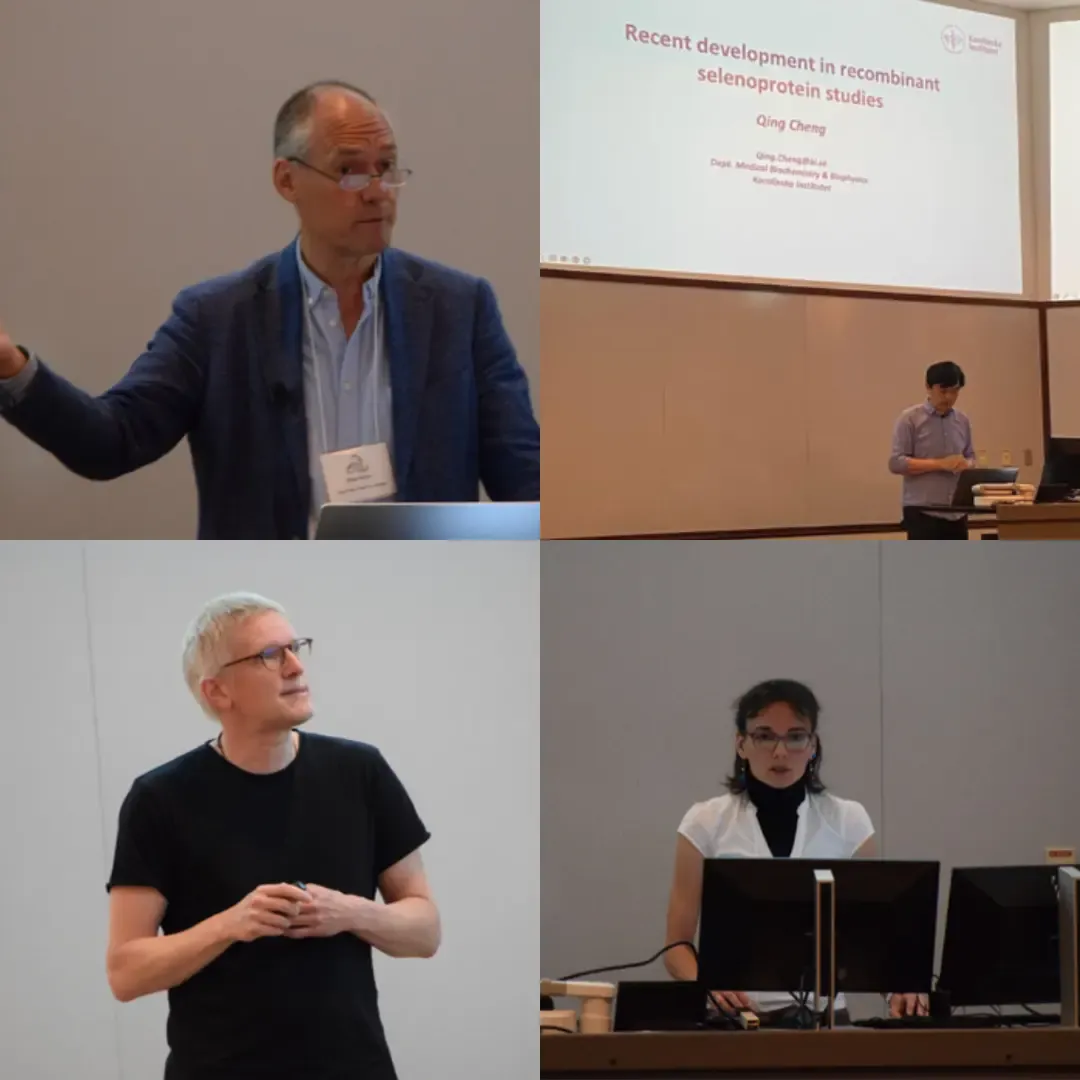
Redox course 2024
In June 2024, our research group participated in the graduate Redox Course organized at the University of Nebraska in Lincoln, USA. The event was a gathering of some of the world experts in the field of redox biochemistry, offering a deep dive into both foundational and cutting-edge aspects of the discipline.
The course featured a series of lectures from members of our lab, including Prof. Elias Arnér, who provided a comprehensive overview of redox cycling and the basic principles of redox biochemistry, with an emphasis on selenoproteins. Dr. Qing Cheng presented his latest advancements in recombinant selenoprotein studies. Dr. Markus Dagnell offered valuable insights into the redox regulation of PTP functions, and Dr. Lucia Coppo imparted her knowledge on glutaredoxins.
Our lab was well-represented too by Maddy Barrett, a joint NIH/KI PhD student, as well as Dr. Beáta Biri-Kovács and Dr. Zsuzsanna Pató from our Budapest team, who brought their unique perspectives to the discussions.
Courses like this course on redox regulation, oxidative stress, and selenoproteins are invaluable for graduate students, providing them with a platform to learn from leading experts and to engage with the latest research in their field. These courses offer a unique opportunity for students to deepen their understanding, develop critical thinking skills, and apply theoretical knowledge to practical challenges. From our lab, we look forward to contributing to future events that foster such invaluable learning experiences.
For more information about the course, visit the course’s website.
SFRR-E annual meeting 2024
The Society for Free Radical Research Europe annual meeting in June 2024 in Istanbul, Turkey, was a gathering of some of the most brilliant minds in redox biology and medicine. Our Stockholm and Budapest teams were well-represented by Pablo Martí Andrés and Attila Andor, who shared their groundbreaking research with the international community.
Dr. Martí-Andrés, a postdoctoral researcher from our Stockholm team, was invited to present his work following his recognition with a Young Investigator Award in Vienna last year. His presentation, “Beyond Reduction: Unveiling TRP14’s Dual Role in Cysteine Homeostasis and Redox Dynamics,” highlighted the multifaceted functions of TRP14, shedding light on its significant impact on cellular metabolism and its implications in disease.
Dr. Andor, from our Budapest team, contributed with his study on the “Selenocysteine Variant of Human Peroxiredoxin 2,” demonstrating that this variant is more active than the wild-type enzyme. This enhanced activity is particularly intriguing considering the crucial role that peroxiredoxins play in redox signaling and the detoxification of hydrogen peroxide.
The SFRR-E annual meeting was an opportunity for Pablo and Attila to not only present their research but also to engage with peers in the field, fostering collaborations that drive scientific innovation forward.
To know more about the meeting, visit the SFRR-E website.
India EMBO Lecture Course on Ageing
In June 2024, New Delhi, India, became a hub for scientific discussion as it hosted the EMBO Lecture Course on Post-transcriptional Regulation in Ageing and Age-Related Diseases. Mahendravarman Mohanraj, a researcher from our Budapest team, represented our group. Dr. Mohanraj delivered an exciting presentation on the role of Thioredoxin-like protein-1 (TXNL1) in cellular pathways.
His research focused into the intricate relationship between TXNL1 and the p62 and NRF2 pathways, particularly in the context of auranofin treatment. Dr. Mohanraj’s findings highlighted that TXNL1 is rapidly degraded by the ubiquitin-independent proteasome pathway, offering new insights into the molecular mechanisms of ageing and potential therapeutic targets.
The event provided the perfect platform for Mahe to share his significant contributions with the global scientific community, furthering our understanding of the complex processes involved in ageing, and showing the dedication of our group to constantly progress in the understanding of key cellular processes.
If you want to know more about the event, visit the EMBO Lecture Course website.
ELRIG Meeting 2024
At the recent European Laboratory Research and Innovation Group meeting focused on Advances in Cell-Based Screening in Drug Discovery, Beáta Biri-Kovács, a researcher from our Budapest team, took the stage at AstraZeneca’s R&D site in Gothenburg, Sweden. She presented a project that’s at the forefront of cellular research: a fluorescent reporter tool designed to monitor the cross-talk of signaling pathways within single cells.
Developed in Prof. Arnér’s lab, this innovative tool has undergone new modifications and improvements, enhancing its ability to track transcription factor activation with single-cell resolution. Dr. Biri-Kovács’s presentation showcased the strides made in refining this technology, which is crucial for understanding complex cellular processes and drug discovery.
The ELRIG meeting was an excellent opportunity for Dr. Biri-Kovács to share the potential impact of this tool in the field and for attendees to witness the cutting-edge research that our team strives to contribute to the scientific community.
For more information, visit the conference’s website.
2023

SFRBM-SFRRI meeting 2023
In November 2023, the Society for Redox Biology and Medicine meeting, organized together with the Society for Free Radical Research International, brought together experts in the field of redox biology and medicine in Punta del Este, Uruguay. Radosveta Gencheva, a PhD student from our research group, was among the attendees. She delivered a flash talk on “Cytotoxicity Mechanisms of Short-Term Exposure to Thioredoxin Reductase Inhibitors,” sharing her latest research findings on this topic with the international scientific community.
Her participation was made possible by a travel award, recognizing the potential impact of her work. The award covered her travel expenses, allowing her to present her study and engage with fellow researchers. This opportunity not only provided a platform for Radosveta to share her research but also served to enhance the visibility of our group’s work.
For more information about the meeting, please visit the SFRBM website.
The Environmental Response IV
Prof. Elias Arnér was a key speaker at the Environmental Response VI symposium, which explored environmental stress response and survival strategies in human beings. The symposium, organized by Masayuki Yamamoto, took place from November 3-5, 2023, at Tohoku University in Sendai, Japan.
The event focused on the KEAP1-NRF2 system, delving into molecular mechanisms, diseases, therapeutic drug development, and the fascinating topic of health in space. Elias, representing our research group, presented on "Selenium in control of ferroptosis –potential roles and cross-talk between glutathione peroxidases and thioredoxin reductases." Prof. Arnér's presentation highlighted the crucial role of glutathione peroxidases in regulating ferroptosis and explored intricate connections with other key enzymatic systems like the thioredoxin system.
The symposium attracted global attention, featuring world-renowned experts in the NRF2 field. The contribution presented by Elias not only demonstrated the latest research from our laboratory but also strengthened our international presence. We look forward to incorporating the discussed advancements from the conference into our ongoing research efforts.
For more information about the event, visit the Environmental Response IV website.
2023 Redox Biology Symposium
On October 12, Prof. Elias Arnér participated in the 2023 Redox Biology Symposium hosted at the University of Nebraska-Lincoln, USA. The symposium focused on the theme "At the intersection of redox and metabolism" and covered essential topics in redox biology, such as selenium, selenoproteins, the thioredoxin family, sulfur metabolism, mitochondrial function, and redox signaling.
Prof. Arnér presented on "Recent discoveries on functions of GPX4, TXNL1, and TXNDC17 in relation to the selenoprotein TXNRD1." This presentation shed light on our lab's cutting-edge research in the field of redox biology, emphasizing the intricate connections between various redox-related proteins.
For more information, please visit the Redox Biology Symposium website.
2023 SFRRE Annual Meeting
Several of our group members attended the 2023 Annual Meeting of the Society for Free Radical Research-Europe in the pictoresque city of Vienna, Austria from June 6-9, 2023. The conference theme was "Redox Biology in Translation," with the aim of bridging the gap among disciplines and fostering the translation of groundbreaking science across the expansive landscape of redox biology and free radical research.
Elias Arnér, Radosveta Gencheva, and Pablo Martí-Andrés represented our laboratory, demonstrating the diversity and impact of our research. Radosveta, one of our Ph.D. students, presented a poster on the effects of TRi-1, a thioredoxin reductase inhibitor developed in our lab. Dr. Martí-Andrés, who received a Young Investigator Award for his work, gave a talk on TRP14, highlighting its newfound role as an essential cellular cystine reductase enzyme. Prof. Arnér chaired a session on thiol modifications in redox signaling pathways.
Our contributions highlighted our lab's leadership in this field, and the meeting provided an excellent platform for our team to contribute to the dialogue shaping the future of redox biology. Our research group's collaborative spirit and diverse expertise make us a driving force in advancing scientific progress.
For more information, visit the SFRRE website.
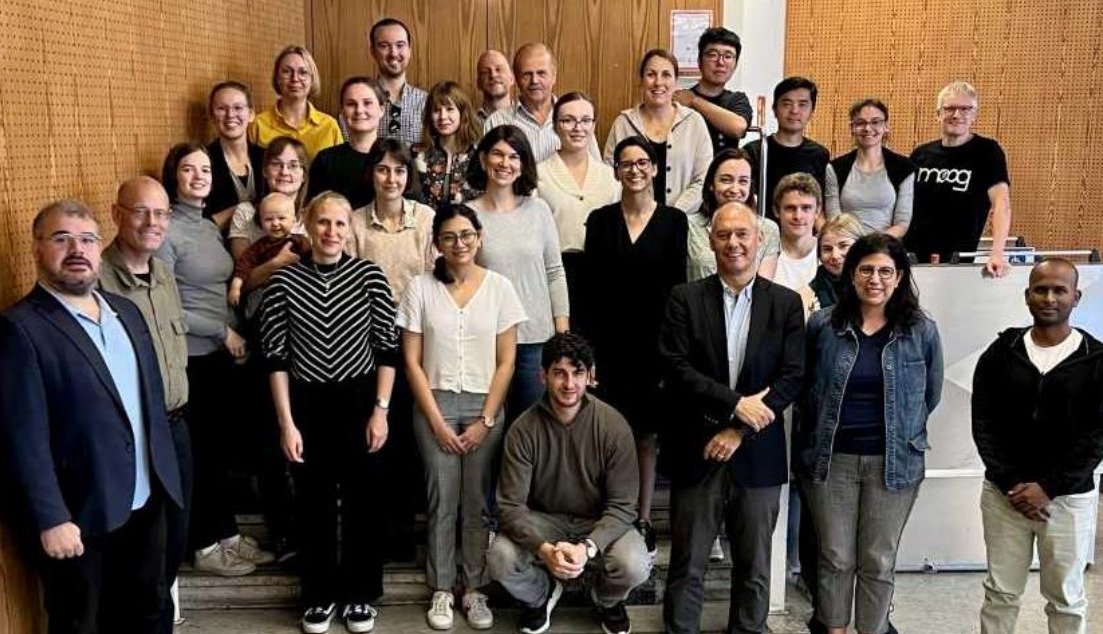
GMS Annual Meeting 2023
In the vibrant heart of Berlin, during the first week of September 2023, our group had the privilege of attending the Annual Meeting of the German Society for Minerals and Trace Elements (GMS). This conference explored a wide array of current topics in the trace elements area, including epidemiology, analytical methods, biomarkers, pathophysiology, nutrition, toxicology, and the intricate relationships between trace elements and their impact on human health and aging.
Our research group presented its latest findings during interactive poster sessions, where we had the chance to meet fellow scientists working in the field and share insights and discoveries. The attendees showed tremendous enthusiasm for our results, ranging from biochemistry, selenoproteins, and biotechnology to redox biology and cancer. This event was not only an opportunity to keep up to date with the latest work in the field of trace elements but also to connect with experts from around the world, strengthening existing collaborations and building new ones.
The whole group had a wonderful time together in Berlin, and we are looking forward to the next meeting.
For more information, visit the GMS website.
2023 Redox Course
Some of our research group members recently gave lectures at the 2023 Redox Course held at the Medical University of South Carolina, USA, from May 1-5. The course, titled "Redox Regulation, Oxidative Stress, and Selenoproteins," provided an in-depth exploration of essential aspects of redox biology.
Elias Arnér, Qing Cheng, and Markus Dagnell, representing our lab, made significant contributions to the course. During the 2023 Redox Course, Prof. Arnér provided insights on redox cycling, basic principles of redox biochemistry, and the intricate world of selenoproteins through several lectures. Dr. Cheng presented the latest developments in recombinant selenoprotein studies, showcasing the cutting-edge advancements made in our lab. Dr. Dagnell contributed his expertise with a lecture on the redox regulation of PTP function.
The course facilitated knowledge exchange among participants and world-renowned experts in the field of redox biology.
We are eagerly anticipating the next edition of this course organized among the Medical University of South Carolina, the University of Nebraska-Lincoln, and Karolinska Institutet.
For more information about this event, please visit the Redox Course website at the University of South Carolina.
2022
12th International Symposium on Selenium in Biology and Medicine
Several members of our research group participated in the 12th International Symposium on Selenium in Biology and Medicine held in Honolulu, Hawaii (USA), from February 16-20, 2022.
Elias Arnér, Qing Cheng, and Markus Dagnell represented our lab at this event. Prof. Arnér presented his expertise on the impact of selenoproteins in controlling cellular fate as an invited speaker. He also shared groundbreaking insights into this crucial aspect of Selenium Biology. Dr. Dagnell inspired the audience with a presentation on the regulation of PTP1B activity by the Thioredoxin and Glutaredoxin/Glutathione systems. Both presentations demonstrated the cutting-edge research being conducted in our laboratory and made a significant contribution to the knowledge shared at the symposium, demonstrating our commitment to advancing the field of Selenium Biology and pushing the boundaries of scientific exploration.
For more information, visit the conference’s website.
